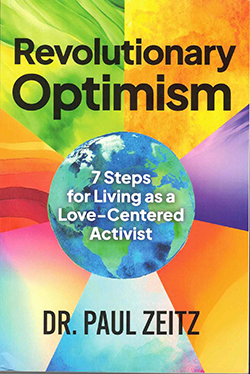Revolutionary Optimism: 7 Steps for Living as a Love-Centered Activist by Dr. Paul Zeitz; #unify Movements; © 2024; ISBN 9798990-264304; 236 pages plus appendices; $18.99.

 SAN DIEGO – This is a handbook for social and political activism, written by a medical doctor who has spent his life engaged in protests, demonstrations, and movements for change. Whether you agree with his positions on a variety of issues, or disagree, reading this book may be enlightening.
SAN DIEGO – This is a handbook for social and political activism, written by a medical doctor who has spent his life engaged in protests, demonstrations, and movements for change. Whether you agree with his positions on a variety of issues, or disagree, reading this book may be enlightening.
If you agree, it describes tactics for furthering your cause. If you disagree, it explains what opposition forces may have planned, providing you with insight into how to anticipate and counter their tactics.
I found myself in agreement with Zeitz’s fight against childhood sexual abuse, AIDS, and environmental degradation, and deeply suspicious of his pro-Palestinian advocacy in which he seemed to be casting his and my fellow Jews as villains in the Middle East struggles.
He wrote of Magen, a 30ish Israeli man whose parents were murdered by Hamas on Oct. 7, 2023, and whose small children were asking, “Can we fix Grandma and Grandpa? And when can we see them again?”
Zeitz went on to report that “even in their grief, Magen and his brother were disturbed by the calls for revenge from the State of Israel they heard in the news and from politicians. Understanding that a vengeful response would only perpetuate and extend the cycle of violence, in the midst of his grief, Magen spoke out through press interviews and by writing op-eds calling for peace. The ensuing violence and the continued suffering of innocent people caught in the crossfire of conflict targeting the Hamas terrorists, he said, is not what his parents would have wanted.”
In my opinion, Zeitz mischaracterizes Israel’s military response to the Hamas massacre that killed some 1,200 Israeli citizens, many of them defenseless young people enjoying the Nova music festival, and took another 250 persons as hostages. Rather than a “vengeful response,” the military campaign in Gaza is an effort to assure that such a massacre—then touted by Hamas as the first of many—should never happen again.
Be that as it may, I found Chapter 29, “10 Best Practices for Building Love-Centered Movements” instructive. In order, the practices included: Set clear movement objectives; develop a clear movement strategy; agree on clear movement targets; build allies and trust; effective organization; frequent peaceful, offensive action; escalation and disruption; messaging and voice; trauma-informed movement building; and self-care.
Zeitz recommends in Chapter 35 that in any mass demonstration involving “non-violent disobedience,” 11 roles be assigned: action leader, police liaison, de-escalator, legal observer, spiritual anchor, media liaison, documenter, song leader, art leader, jail support, and a legal expert.
Sympathizers, who for one reason or another cannot participate in the demonstration, can still contribute to the cause. Six ways they may do this are to provide emotional support… food and housing… medical support…social media support …well-being and spiritual support … and financial support.
*
Donald H. Harrison is publisher and editor of San Diego Jewish World.